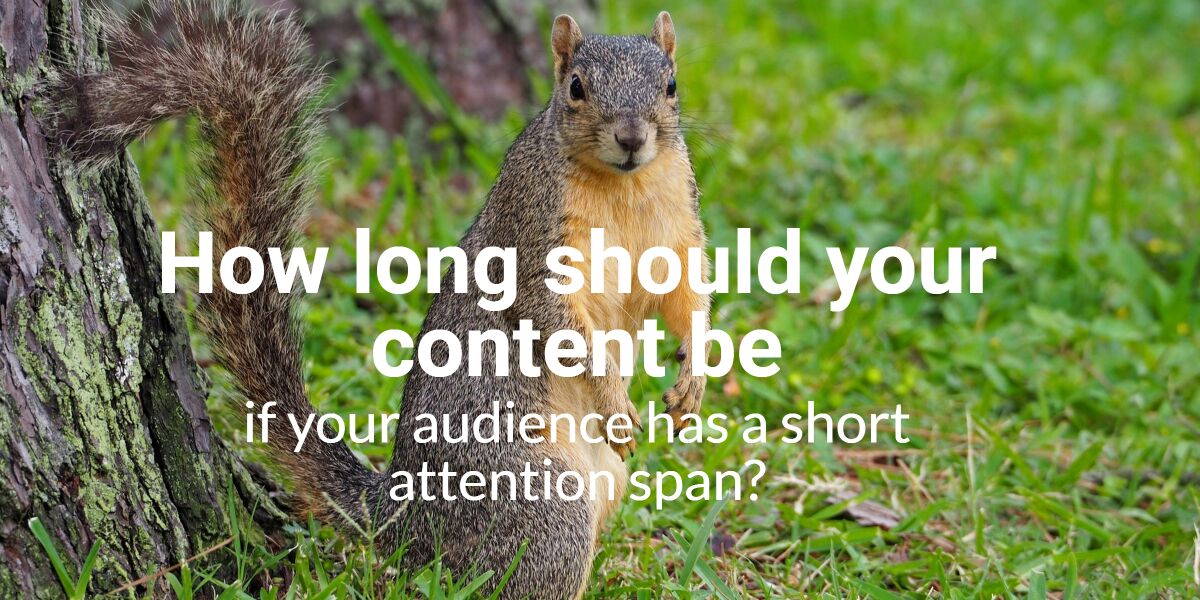
Recently I had an email conversation with a consultant, who works with enterprise executives, about her blog content.
She expressed concern about posting high-value content to her blog — because high-value tends to be longer than the 800-word posts she was used to publishing, and her audience of busy executives “have short attention spans.”
I about fell over in my chair when I read that.
It felt like such a perfect example of how we all get way too close to our area of expertise, continue to follow rules that no longer apply, and lose touch with how other people see and experience our work.
You see, “attention span” doesn’t matter to me when I’m writing content and copy for my clients. (Well, not much.)
We hear comments about shrinking attention spans all the time in the marketing space — “people have short attention spans nowadays, thanks to technology” and “humans now have shorter attention spans than goldfish” — and yeah, you DO have to work harder to get people’s attention these days.
But that has nothing to do with the length of your content and copy.
If you meet the reader where they’re at in the buying journey and give them value (entertainment, inspiration, education, information) every step of the way, it doesn’t matter how long your content is — they’ll keep reading, and they’ll act on it.
In fact, longer copy and content tend to perform better than their shorter counterparts (read here and here and here and here and here for a few of the many studies on that). For example, studies show that long-form blog posts perform better than short-form blog posts do, and longer sales pages convert better than short ones in most cases.
(Shorter copy/content of course has it’s place — usually with unaware audiences that you are then pointing to other content in order to build the relationship. But again, short is relative — so there are no “rules.”)
In other words, people are too quick to blame short attention spans for their copy/content not getting them the results they’re after.
I have a rule at Horizon Peak: Focus on value.
In my experience, if you stay focused on providing value, you will always get better results from your marketing.
So let’s flip the script. Instead of worrying about short attention spans, think about what value you want to provide to your audience, and how they’ll get that value when they come across your content.
- If they’re referred to you, and they’re checking out your website to see if you’re the expert they’re looking for: Are you providing value? What impression are you leaving them with?
- If you share your post on social media: What value are you giving people who click through to read your post? Are you giving them content that’s worth sharing?
- If they find your blog post through organic search (which, btw, happens more often when your blog posts are longer and more in-depth): What value will they get from the post? Will it get them thinking “This is helpful! Let’s see what else is on this website”?
- If you send out your blog post to your email list: Are you giving them content that genuinely helps them? What are the chances they’ll say “Wow — I’ve got a colleague/peer who needs to read this”?
Frankly, the length of your content and copy should be pretty low on your list of priorities.
This blog post is a perfect example.
It’s short for a blog post. But you’re learning something important: that you can ignore all the hype about “short attention spans” as long as you’re providing value to the reader.
I’m also going to send this content out in an email to Horizon Peak subscribers. And guess what? Technically, it’s long for an email. Does that change its value, though? Will the reader get farther with the blog post than they would with the email? NO.
I release you from obsessing about your audience’s attention span.
Go forth and give them something that will actually help them in their daily lives.
